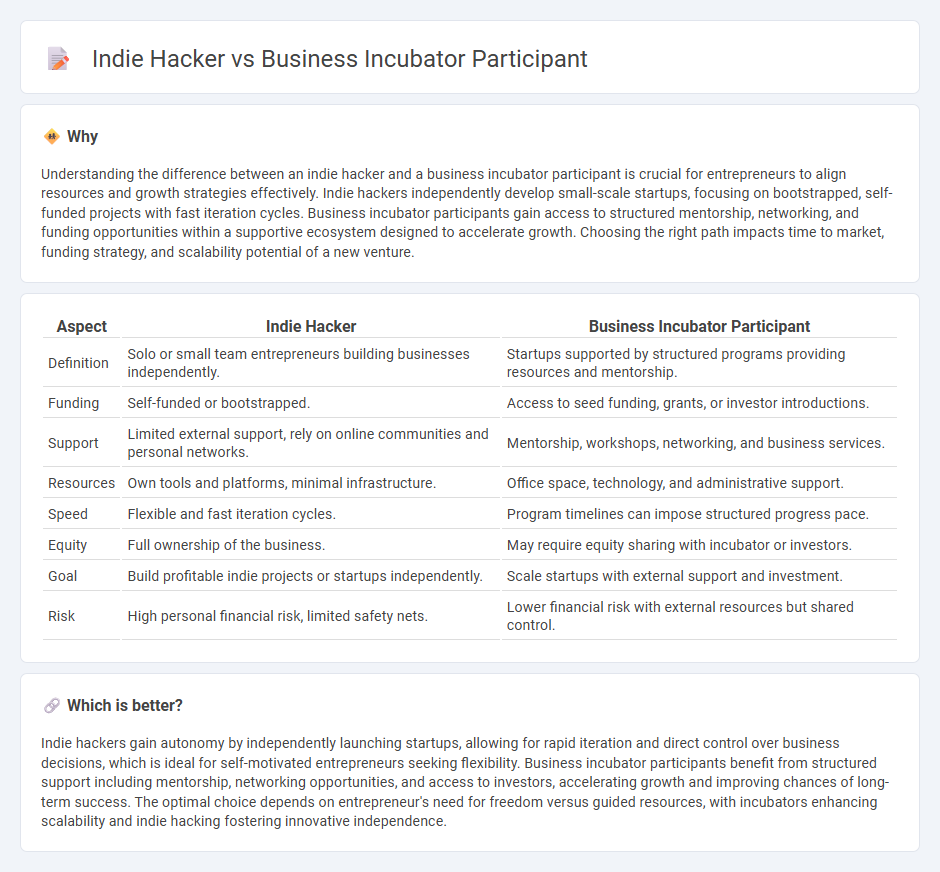
Indie hackers launch startups independently, leveraging minimal resources and focusing on rapid product development and market fit validation. Business incubator participants benefit from structured support, mentorship, and access to funding networks during early-stage growth. Explore the distinct advantages of each path to determine which entrepreneurial approach suits your goals best.
Why it is important
Understanding the difference between an indie hacker and a business incubator participant is crucial for entrepreneurs to align resources and growth strategies effectively. Indie hackers independently develop small-scale startups, focusing on bootstrapped, self-funded projects with fast iteration cycles. Business incubator participants gain access to structured mentorship, networking, and funding opportunities within a supportive ecosystem designed to accelerate growth. Choosing the right path impacts time to market, funding strategy, and scalability potential of a new venture.
Comparison Table
| Aspect | Indie Hacker | Business Incubator Participant |
|---|---|---|
| Definition | Solo or small team entrepreneurs building businesses independently. | Startups supported by structured programs providing resources and mentorship. |
| Funding | Self-funded or bootstrapped. | Access to seed funding, grants, or investor introductions. |
| Support | Limited external support, rely on online communities and personal networks. | Mentorship, workshops, networking, and business services. |
| Resources | Own tools and platforms, minimal infrastructure. | Office space, technology, and administrative support. |
| Speed | Flexible and fast iteration cycles. | Program timelines can impose structured progress pace. |
| Equity | Full ownership of the business. | May require equity sharing with incubator or investors. |
| Goal | Build profitable indie projects or startups independently. | Scale startups with external support and investment. |
| Risk | High personal financial risk, limited safety nets. | Lower financial risk with external resources but shared control. |
Which is better?
Indie hackers gain autonomy by independently launching startups, allowing for rapid iteration and direct control over business decisions, which is ideal for self-motivated entrepreneurs seeking flexibility. Business incubator participants benefit from structured support including mentorship, networking opportunities, and access to investors, accelerating growth and improving chances of long-term success. The optimal choice depends on entrepreneur's need for freedom versus guided resources, with incubators enhancing scalability and indie hacking fostering innovative independence.
Connection
Indie hackers and business incubator participants share a common goal of launching and scaling startups through innovation and resourcefulness. Business incubators provide indie hackers with mentorship, funding opportunities, and access to industry networks that accelerate product development and market entry. This symbiotic relationship fosters an environment where indie hackers transform ideas into viable businesses with structured support from incubators.
Key Terms
**Business incubator participant:**
Business incubator participants benefit from structured mentorship, access to funding, and collaborative resources designed to accelerate startup growth. They leverage professional networks and formal programs to refine business models and scale operations efficiently. Explore how joining a business incubator can transform your entrepreneurial journey.
Mentorship
Business incubator participants benefit from structured mentorship programs providing tailored guidance, industry connections, and resource access to accelerate startup growth. Indie hackers pursue self-driven mentorship through online communities, peer collaborations, and informal networks, fostering independence and creative problem-solving skills. Explore the unique mentorship advantages of each path to decide the best fit for your entrepreneurial journey.
Networking
Business incubator participants benefit from structured networking opportunities, including access to mentors, investors, and peer entrepreneurs within the incubator ecosystem, fostering collaborative growth and resource sharing. Indie hackers typically build networks more organically through online communities, social media, and niche forums, prioritizing autonomy and self-driven connections over formal programs. Discover how these distinct networking approaches impact startup growth and sustainability by exploring their unique advantages.
Source and External Links
How a Business Incubator Program Can Help Your Startup - A business incubator participant typically applies with a business plan and experiences an interview to access resources like workspace, mentoring, and seed funding to help launch and grow their startup.
What Is a Business Incubator and How Does It Work? - Participants in business incubators need to research suitable programs, submit applications including a business plan, potentially attend interviews, and review terms that may include equity or fees if accepted.
Business incubator - Business incubator participants must meet admission criteria with feasible, workable business ideas and plans, and they can benefit from shared office space, virtual counseling, and varied program durations typically averaging around 33 months.
 dowidth.com
dowidth.com